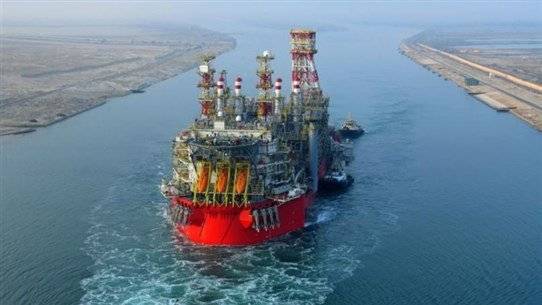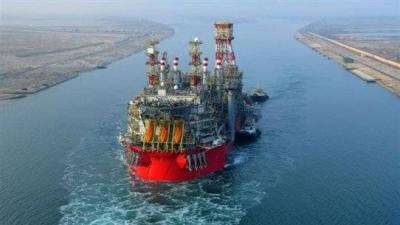As Beirut awaits the return of the American mediator in the maritime border demarcation file with the occupied Palestinian territories, Amos Hochstein, who is supposed to bring an Israeli response to the Lebanese demarcation proposal submitted by President Michel Aoun, Tel Aviv has initiated planning to indirectly seize Lebanese maritime resources through a third party by presenting "Energean" as a technical solution to Lebanon's energy crisis.
The time frame set by Deputy Speaker Elias Bou Saab to receive the Israeli response to the proposal submitted by Beirut regarding the maritime dispute with the enemy is running out. This proposal, mediated by Amos Hochstein, stipulates the adoption of line 23 with deviations that place the "Qana Field" within the Lebanese share. "Al-Akhbar" learned that the deadline may be extended to early next month, when the American envoy is expected to return to Beirut to officially deliver the content of the Israeli response and discuss how to turn the understandings into an agreement or not, with expectations that the envoy's return will depend on the nature of the Israeli reply. If it is contrary to what Lebanon expects, he may eliminate the visit in favor of sending the response with American Ambassador Dorothy Shea.
Hebrew media reported that the Lebanese proposal presented orally by Aoun to Hochstein is now on the table of officials in Tel Aviv. The Israeli website "Globes" mentioned that the political level in Tel Aviv is studying the proposal without indicating deadlines for providing a response. Meanwhile, there is ambiguity in Lebanon regarding the possibility of "attachments" to the Lebanese offer that remain undisclosed, while Hebrew media has somewhat ceremoniously referred to the contents conveyed by Hochstein to Tel Aviv as a proposed plan from the Lebanese presidency. According to "Globes," American sources and those referred to as "involved in mediation" stated that the Lebanese proposal primarily concerns the shared "Qana" field between the Lebanese and Israeli economic zones (according to the site). They added, "The Lebanese president aims to ensure that Lebanon receives most of the gas production in this field," which contradicts what Aoun conveyed to Hochstein, that the principle of bending the line in front of "Qana" allows Lebanon to obtain the entire field.
Notably, the site mentioned that the Lebanese side has dropped its requests regarding the "Karish" field, which has been reported in official Lebanese statements as a contested field. This confirms information received by "Al-Akhbar" that Hochstein's condition for returning to Beirut was fundamentally based on Lebanon's abandonment of any claims south of line 23, which indeed occurred. According to Hebrew sources, "Lebanon is now ready to reach an agreement based on line 23" without specifying Tel Aviv's position, as the author of the article in "Globes," Danny Zaken, clarified that "Aoun will avoid raising any claims regarding the Karish field if Israel accepts Lebanon's demand regarding the Qana field," meaning to exclude Karish from the dispute.
The atmosphere prevailing in Tel Aviv has impacted future energy investment plans. In a move reflecting the reasons for international companies' reluctance to submit investment offers in Lebanese blocks within the licensing round that Beirut opened last fall, which was extended on the 15th of this month, and along with the diminished responsibility displayed by "Total" regarding Lebanese rights, the position taken by the CEO of "Energean," Mathios Regas, drew attention. He expressed his company's readiness to invest in natural gas exploration in Lebanon if a solution to the maritime border crisis with Israel is reached. Regas's position, which can be framed as an incentive offered to Lebanon to encourage it to sign a maritime border solution with the enemy entity, is tied to the "joint reservoirs project" that Hochstein aims to achieve between Beirut and Tel Aviv through a third company.
If we consider the maritime area that "Energean" is investing in, located mostly adjacent to the southern Lebanese maritime border, and Tel Aviv's insistence on sharing with Lebanon in blocks 8 and 9, it becomes reasonable to believe that the Greek company in appearance and Israeli in essence is planning for the long term to propose itself as a solution for investing in Lebanese gas reserves with American support and a safe approach based on its relations with Tel Aviv. This is similar to how Egyptian gas and Jordanian electricity are proposed as interim solutions, and as a reward for what is called "the moderation of Lebanese maritime demands."
It is noteworthy that the understandings that took place among the main Lebanese forces on the eve of Hochstein's arrival included a unified decision to inform him that Lebanon rejects any formula for a solution that imposes even a formal type of cooperation or sharing in exploration, extraction, or gas sales. President Berri informed the American envoy that Lebanon would not accept any step considered an entry point for any type of normalization.




